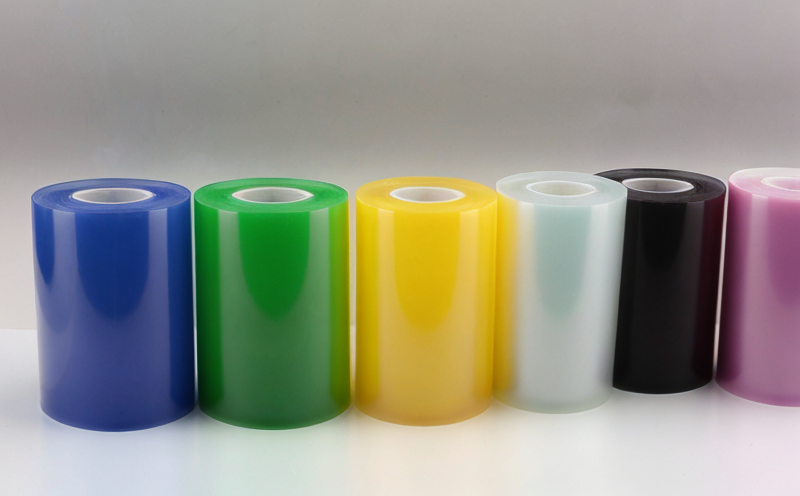ASTM D6866 Radiocarbon Content Testing of Plastic Films
The Polymer & Plastics Testing division at our laboratory offers a comprehensive suite of testing services, including the ASTM D6866 Radiocarbon Content Testing of Plastic Films. This test evaluates the radiocarbon content in plastic films to ensure compliance with regulations governing the use of plastics derived from recycled materials. The importance of this test cannot be overstated for industries that rely on sustainable practices, especially those involved in packaging manufacturing and environmentally conscious product development.
The ASTM D6866 standard provides a method to determine the radiocarbon content of plastic materials using accelerator mass spectrometry (AMS). This method helps identify the age of the material by measuring the ratio of carbon-14 isotopes. The test is particularly useful in distinguishing between fossil fuel-based plastics and those derived from recycled biomass, which may have higher levels of radiocarbon due to their biological origin.
The testing process involves several critical steps to ensure accuracy and reliability. Specimens are first prepared according to the specified guidelines outlined in ASTM D6866. The samples undergo rigorous chemical treatments followed by AMS analysis. This process ensures that any plastic films tested adhere strictly to international standards, thereby enhancing product integrity.
Our team of experts uses advanced instrumentation such as high-resolution mass spectrometers and precise sample preparation techniques to deliver accurate results within the acceptable tolerances defined in ASTM D6866. The test parameters are carefully controlled to minimize errors, ensuring consistent outcomes across all samples processed.
The radiocarbon content testing is crucial for industries seeking to meet stringent regulatory requirements. By adhering to this standard, manufacturers can ensure that their products do not contain excessive amounts of radiocarbon from fossil fuel sources, thus promoting sustainability and reducing environmental impact.
- Customer Impact: Ensures compliance with international regulations on the use of recycled materials in plastic manufacturing.
- Sustainability: Supports sustainable practices by identifying biobased plastics accurately.
- Quality Assurance: Guarantees product integrity and consistency across batches.
The results from this testing are vital for manufacturers who need to balance cost-effectiveness with environmental responsibility. By understanding the radiocarbon content of their raw materials, companies can make informed decisions about sourcing recycled plastics, which helps in reducing dependency on virgin fossil fuel-based polymers.
Our laboratory is committed to providing accurate and reliable test results that meet or exceed international standards. With a deep expertise in polymer science and extensive experience in conducting ASTM D6866 tests, we offer unparalleled service quality. Our clients can trust us to deliver precise measurements that help them stay ahead of industry trends while maintaining regulatory compliance.
Why It Matters
The importance of radiocarbon content testing for plastic films cannot be overstated in today's world where sustainability is a key focus. This test ensures that products are made from the most environmentally friendly materials possible, thereby reducing the carbon footprint associated with manufacturing processes.
For quality managers and compliance officers, ensuring adherence to international standards like ASTM D6866 is essential for maintaining product integrity and meeting regulatory requirements. R&D engineers also rely on these tests to innovate sustainable solutions while staying compliant with global norms.
In addition to supporting environmental initiatives, this testing helps procurement teams source materials that align perfectly with corporate sustainability goals. By knowing the radiocarbon content of their suppliers' products, they can make informed choices about which suppliers meet their criteria for eco-friendliness and sustainability.
The ability to accurately measure radiocarbon content is particularly beneficial in industries such as packaging manufacturing where every gram counts towards overall weight reduction efforts without compromising on quality or safety. It also plays a crucial role in ensuring that products comply with stringent regulations regarding the use of recycled materials, thereby fostering trust among consumers who increasingly demand environmentally responsible practices.
With increasing pressure from governments and consumers alike to reduce waste and promote recycling, radiocarbon content testing has become indispensable for manufacturers aiming to enhance their environmental credentials. By leveraging this technology, companies can contribute positively towards sustainable development goals while maintaining competitive edge in the marketplace.
Applied Standards
The ASTM D6866 Radiocarbon Content Testing of Plastic Films adheres strictly to international standards such as ASTM D6866-19, which specifies a procedure for determining the radiocarbon content of plastic materials using accelerator mass spectrometry (AMS). This standard is widely recognized and used globally by manufacturers seeking to ensure their products meet rigorous quality benchmarks.
The test involves several key steps that must be followed meticulously to achieve accurate results. Specimens are prepared according to strict procedures outlined in the standard, ensuring consistency across all samples processed. These specimens then undergo precise chemical treatments before undergoing AMS analysis. The precision of this process is critical in obtaining reliable radiocarbon content readings.
The results generated from these tests play a pivotal role in determining whether plastic films comply with regulatory requirements regarding the use of recycled materials. Compliance with ASTM D6866 helps manufacturers avoid legal issues and maintains consumer confidence by demonstrating adherence to high ethical standards.
Our laboratory adheres strictly to the procedures specified in ASTM D6866, ensuring that every sample tested meets or exceeds the required specifications. This commitment to accuracy is reflected not only in our equipment but also through rigorous training programs for our staff members who perform these tests daily. We pride ourselves on delivering consistent and reliable results that can be trusted by all stakeholders involved in polymer & plastics testing.





